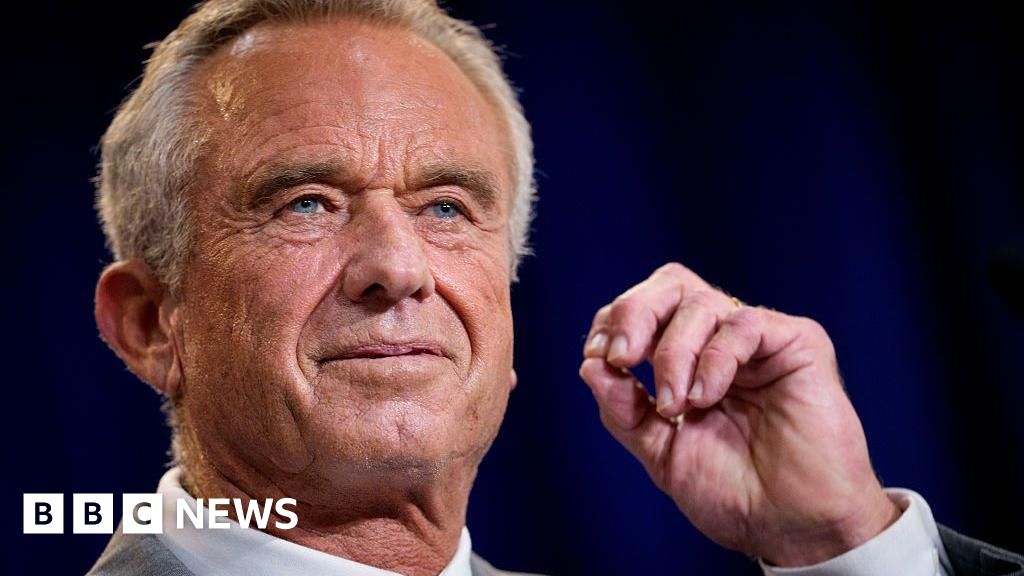mRNA vaccines were heralded as a medical marvel that saved lives during the Covid pandemic, but now the US is pulling back from researching them. US Health Secretary Robert F Kennedy Jr has cancelled 22 projects – worth $500m (£376m) in funding – for tackling infections such as Covid and flu.
Kennedy says he has reviewed the science on mRNA vaccines, concluding that the “data show these vaccines fail to protect effectively against upper respiratory infections like COVID and flu”. Instead, he says, he would shift funding to “safer, broader vaccine platforms that remain effective even as viruses mutate”.
Prof Adam Finn, vaccine researcher at the University of Bristol, says “it’s a bit of both” but ditching mRNA technology is “stupid” and potentially a “catastrophic error”. The claim that mRNA vaccines do not protect against upper respiratory infections like Covid and flu “just isn’t true”, says Prof Andrew Pollard from the Oxford Vaccine Group.
The vaccines were shown to provide protection – keeping people alive and out of hospital – in both clinical trials and then during intense monitoring of how the vaccines performed when they were rolled out around the world. In the first year of vaccination during the Covid pandemic, it was estimated that the Pfizer/BioNTech mRNA vaccine alone saved nearly 6 million lives.
The mRNA Covid vaccines train the immune system to target just one protein out of the whole virus. If that protein in the coronavirus changes or mutates then the body’s protection is lessened. We have seen the consequences of that – immunity wanes and the vaccines need to be updated.
One theoretical argument is that a different vaccine approach – such as using the whole virus – would give better protection, as the immune system would have more to target. However, Prof Pollard says the mRNA vaccines performed better than the inactivated ones when tackling Covid.
The need to update vaccines is not a failing of mRNA technology that can be easily solved by pivoting from one technology to another – instead, it is down to the fundamental nature of some viruses. The same measles or HPV (human papilloma virus) vaccines have been effective for decades and show no sign of failing as the virus’s genetic codes are more stable in each case.
But some viruses live in a perpetual state of flux. Flu, for example, is not one virus – but instead a constantly-shifting target. At any time, one strain will be in the ascendancy and be the most likely to cause trouble in winter. In flu, the inactivated flu injection that is given to adults is updated every year – as is the live vaccine that is given to children as a nasal spray. A future mRNA form of flu vaccine would work the same way.
Prof Pollard says: “I don’t think there’s the evidence they are hugely better for protection, but where RNA tech is streets ahead of everything else is responding to outbreaks.” The world is highly drilled at making new flu vaccines each year. But even then, there is a six-month process of deciding on the new flu strains to be targeted, growing the vaccine at scale in chicken eggs and then distributing it. Brand new vaccines take even longer.
But with mRNA, you can have the new vaccine in six to eight weeks, and then tens or hundreds of millions of doses a few months later. Some of the projects that have had their funding pulled in the US were preparing for a bird flu pandemic. That virus, H5N1, has been devastating bird populations and jumping into a wide range of other animals including American cattle.
“That doesn’t make sense and if we do get a human pandemic of bird flu it could be seen as a catastrophic error,” says Prof Finn. But the ramifications of the US turning away from mRNA research could be felt more widely. What impact does this move have on confidence in the current vaccines, mRNA or otherwise? How does it affect the world when the US is one of the most influential countries in medical research? And will it have a knock-on impact on other types of mRNA technology, such as cancer vaccines – or using the approach to treat rare genetic diseases?
Prof Pollard poses another question after RFK Jr’s move: “Does it put us all at risk if a huge market is turning its back on RNA? “It is one of the most important technologies we’ll see this century in infectious disease, biotherapeutic agents for rare disease and critically for cancer. It’s a message I’m troubled about.”
Source link




